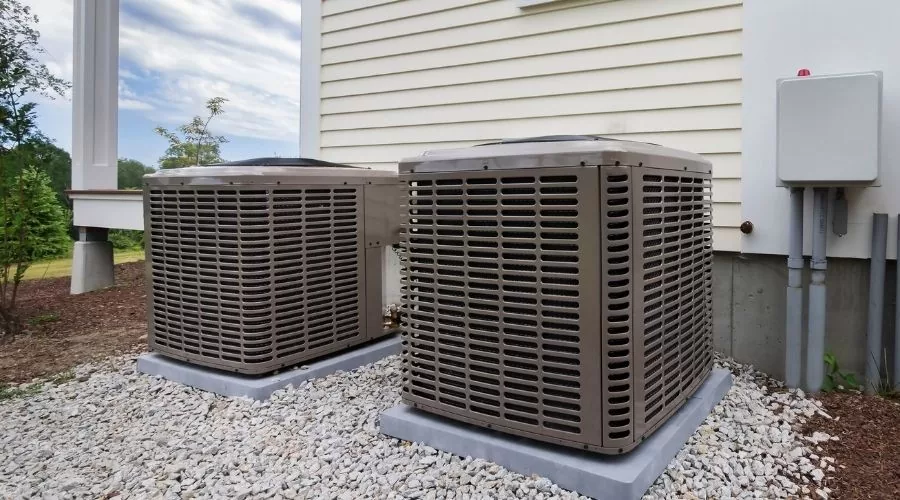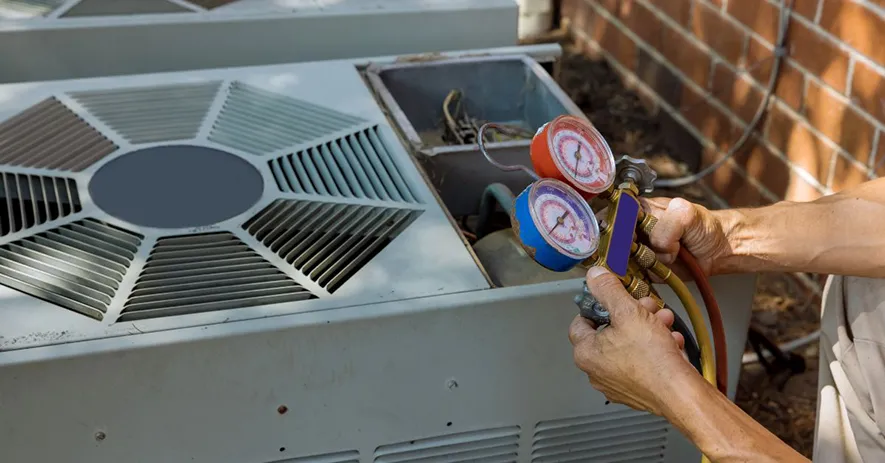If you live in Portland, your AC blowing hot air is the last thing you need. Your air conditioner blowing warm air in the middle of summer in Portland is the stuff of nightmares for some of us.
Unfortunately, an AC blowing warm air is a more common occurrence than we would like to accept. Still, there are precautions and preventive measures we can take to ensure only cool air fills up our home all summer long.
Air Conditioner Blowing Warm Air: Should I Be Worried?
While your air conditioner is affected by the climate, it shouldn't result in your AC blowing hot air. Air conditioners have internal components to help fight off the natural temperature to provide your home's air with quality heating and cooling satisfactory to your comfort.
Your AC blowing hot air when its thermostat setting is set to a lower temperature indicates underlying issues leading to the malfunction.
Why Is My Air Conditioner Blowing Warm Air?
If your reliable air conditioner starts blowing hot air in the middle of summer, it's easy to blame the sudden spike in air temperature outdoors. An inefficient or poorly maintained air conditioning system is more likely to succumb to the sweltering outdoor temperature than a well-maintained HVAC system.
You should always opt for high-efficiency air conditioners and schedule routine maintenance, especially if you live somewhere with polarizing shifts in weather. Your AC blowing hot air may be due to system malfunctions that only worsen over time and require immediate professional attention. If your AC is blowing hot air, it may need a tune-up.
For example:
- Replenishing low refrigerant levels
- Cleaning clogged air filters
- Defrosting frozen evaporator coils
The list above is typical procedures during an annual tune-up for proper system maintenance. Unless you have the necessary equipment, techniques, and know-how, an experienced professional should only carry out these steps.
It would be best if you had a reliable HVAC technician look into your AC unit yearly to prevent it from undesirably blowing warm air during summertime and keep the frequency of your AC problems to a minimum.
Most Common Causes for an Air Conditioner Blowing Warm Air
Some AC problems occur under particular circumstances, like earthquakes, fires, and other disasters. Some air conditioners may survive the initial impact and perform acceptably for some time. However, its internal components may be dislodged or damaged, leading to its subpar performance.
If your AC blowing hot air is accompanied by a leak, a refrigerant leak may be to blame. Dislodged components can rattle around the internal system, damage coils, and make your AC blow warm air due to leaking refrigerant.
If your current air conditioning system has never been through such physical impacts, it may just be blowing hot air due to typical AC issues.
Here are some of the most common causes homeowners throughout Portland report having with their air conditioning systems.
Malfunctioning Thermostat Settings
Before we go tinkering into internal mechanisms, let's examine the most accessible component of your air conditioning unit. Ensure your thermostat isn't set to a high temperature, making it blow warm air, proving its system is functioning correctly instead of otherwise.
If its heating function is on or its fan is off, you can eliminate all the hot air blowing through your ductwork by altering its settings to your preference. If your thermostat is set to a low temperature and all you feel is your AC blowing warm air, then we can address other issues.
Your thermostat might still be the problem here. If a remote thermostat controls your air conditioner's temperature, ensure its batteries are still active, and its transmitter is pointed in the right direction. If your thermostat comes in a wall installation, faulty wiring issues might hinder its connection to the air conditioner.
Please don't attempt to dismantle and rewire the thermostat yourself. Handling wires without knowing what to do with them might cause injuries and further issues with your air conditioning unit. Your best bet is to call a professional to examine the unit.
Faulty Compressor Circuit Breaker
Wires have more to do with your air conditioner than just its temperature controls. The wiring system of your air conditioner is within its two components, the indoor AC unit (AC air handler) and the outdoor AC unit (AC compressor).
Your AC unit won't blow cold air into your home's ductwork if its AC compressor has a blown fuse and is short-circuiting.
The AC compressor uses fans to absorb outdoor air into your AC unit and facilitate airflow into evaporator coils for temperature adjustments before blowing them through the ductwork or air handlers of your AC.
However, if your AC is blowing hot air, it may be due to blower motors being unable to power fans or the rest of your HVAC system's electrical components. If coils don't have enough power to function, you will have warm air coming through your air handlers.
Double-check if everything is in order with your home's circuit breaker or fuse panel. If its main breaker is off, simply flip the switch back on to get a cool breeze on a hot day in your home.
Air Filters
A dirty air filter can hinder airflow. An abundance of backflow can cause malfunctions and prod other components to overcompensate.
Your blower motor might end up blowing a fuse by speeding up fans to rectify airflow and air exchange. Additionally, dirty filters can contaminate your AC system, blowing hot air and pollutants into your home.
An abundance of pollution in your home can compromise your home's indoor air quality and harm your health.
Depending on usage, air filters must be cleaned or replaced every several months. It's best you regularly open ventilation systems to prevent any harmful particles from lingering indoors.
You should also call an HVAC technician to change filters unless your unit has accessible air filters.
Dirty outdoor or indoor Coils and refrigerant leak
Your coils work in tandem to relieve your home of the ambient warmth by conditioning the air it absorbs indoors with the refrigerant it receives from your outdoor unit (condenser coil). The indoor coil (evaporator coil) is responsible for removing heat by reconditioning air with refrigerant.
However, your coils won't be able to do their job when they suffer from rust, contamination, cracks, and a refrigerant leak. Dirty air filters might allow more contaminated particles through, latching on to different components. Your coils may malfunction after accumulating enough contamination.
Refrigerant Leak
Refrigerant, also known as Freon, is a liquid used in refrigeration. The liquid refrigerant storage is found within the outdoor unit.
Your AC unit's refrigerant transforms into liquid or gas depending on where in the cycle it is needed. Refrigerant is essential in heating and cooling, traveling between your condenser and evaporator coil through refrigerant lines.
Low refrigerant levels greatly impact your air conditioner's ability to perform.
If your AC unit is leaking refrigerant, your AC system not blowing cold air is the least of your worries. Liquid refrigerant can travel into the wiring, resulting in a blown fuse or short-circuiting your system.
It can also freeze your evaporator coils, preventing your AC from blowing cold air until they are restored to their original state.
Your air conditioning system is blowing hot air because frozen coils trick your AC unit into thinking it has provided your home with enough cool air to lower the temperature of your coils to sub-zero levels.
The refrigerant in its gaseous state can lead to low-pressure gas buildup. Without your coils performing their duties, they will build into high-pressure gas and hinder air exchange. High-pressure gas building up within your AC unit is a no-no.
It will cause a plethora of problems.
Contact professionals if you hear bubbling or hissing noises indicating a leak. An HVAC professional can defrost your coils, recharge refrigerant levels, and patch up any leaks in refrigerant lines.
Other HVAC System Malfunctions
Almost all cooling systems depend on refrigerant to blow cool air. Heat pumps come built into your air conditioner, responsible for blowing cool or warm air into your home. However, a heat pump doesn't only belong within an AC system and can provide your home with cold air without the help of an AC unit. Expect compromised refrigerant levels if your heat pump or AC is blowing hot air.
What's the Difference Between an Air Conditioner and Heat Pump?
Like an AC system, it has an indoor and outdoor unit. Unlike a central, mini-split, or window AC, a heat pump can provide your home with cooled air.
You have an HVAC system with heat pump integrations if you can alter your indoor temperature to a cooler setting. Still, there are standalone heat pump systems you can choose from. They have higher upfront costs but make more sustainable installations in the long run.
Energy Efficiency
Any air conditioner with a SEER rating of 14 and above is considered energy-efficient. However, if you are looking for high-efficiency systems, you can't go wrong with heat pump systems. They source heat energy from natural elements, with geothermal (ground source) coming out on top.
It would be best if you kept your AC units clean and well-maintained. Their improper installation and poor maintenance can weather your AC systems and their efficiency over time. A heat pump isn't immune to suffering from a dirty evaporator coil.
How to Clean Your Air Conditioner
A well-maintained older air conditioner beats high SEER-rated AC systems. If your AC comes with accessible air filters, you can detach them from the unit for cleaning. It is ill-advised to go in there to clean coils. You might cause more damage than you started with and hurt yourself. However, if you have the necessary know-how, remember to:
- Use a gentle detergent.
- Mix it with two parts of warm water.
- Use a spray bottle to get the cleaning compound on the coils.
- Give it enough time to sit, no less than ten minutes.
- Use a soft cloth to wipe away any dirty buildups.
That should be enough to clean away any dirt. It's a different story when there's a leak in the refrigerant line.
You should leave internal or extensive cleaning to the pros.
Is It Time to Call in an HVAC Professional?
Call in the pros when you hear unusual noises from your AC units or experience air handlers blowing hot air into your home. You should also call someone if you notice a leak from your AC indoor handler. It would be best if you didn't wait for symptoms to worsen before you call for an inspection or repair service.
Additionally, an annual preventive maintenance service should prevent any undue breakdowns in the middle of summer!
Sunset Heating and Cooling Electrical
You don't have to settle for expensive or unreliable services. If you have AC issues in Portland, look for Sunset Heating and Cooling Electrical for the most reliable and trustworthy experts.
Call our main office if you need reliable and affordable ac refrigerant leak repair and thermostat repair.







